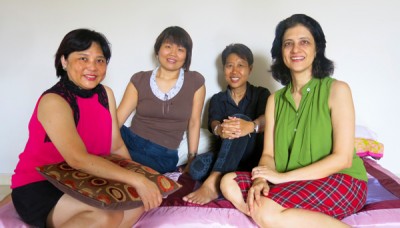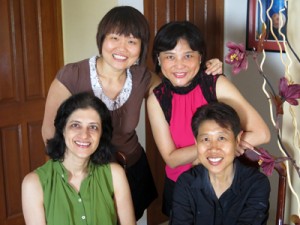Young Children’s Voices in Mathematical Problem Solving
Contributed by Dr Ho Siew Yin and Sng Wei Qin Abbie, from NTUC First Campus, for SingTeach Virtual […]
Read More
In the course of their teaching work, much is expected of teachers. Now, many of them are donning the research hat as well. But research can be a fulfilling journey, especially if you have the support of like-minded friends.

Jessie Tan, Lim Soh Peng, Edna Tay, and Simmi Govindani agree that in a group, research doesn’t seem so unnerving anymore
Through a North Zone Cluster initiative called the LEAD (Learners And Designers) programme, four energetic LEAD2 Teachers met and became not just good friends, but also comrades in research.
They come from different schools and very different backgrounds, and teach different subjects. They are Lead Teachers Ms Edna Tay, Ms Lim Soh Peng, Mrs Simmi Govindani and Senior Teacher Mdm Jessie Tan.
Despite these differences, they have similar ideals, hopes and visions. As their final project under the LEAD Programme, they chose something close to their hearts: mentoring other teachers.
In 2010, a group of seven LEAD2 participants came together to create a package for mentoring Beginning Teachers in eight modules, for the purpose of transfer of learning.
They shared it at numerous national platforms, such as symposia conducted by the North Zone Cluster and NIE and at various secondary and primary schools upon invitation.
Based on The Skilful Teacher’s (TST) Map of Pedagogical Knowledge, their package infuses Learning Organization tools in their lesson plans and focuses on the first two layers of the pyramid: Foundation of Essential Beliefs and Management of the classroom. (For more details, see box story, “Mentoring in a Nutshell”.)
Through their sharing and by word of mouth, 150 schools became interested and have been assigned rights to access the package. As the package is aligned closely to TST, the team has acquired permission from Research for Better Teaching to share their work.
For beginning teachers, you can learn from others. Then you can leverage each other’s strengths and hopefully you will be a bit braver to want to try out research.
– Lim Soh Peng, Malay Language teacher at Presbyterian High School
From the numerous requests they have received for the package, the team feels that they have a good product.
“This has gone on for about 2 years and it’s time for us to know whether we’re doing the right thing,” says Jessie, “and get some sort of feedback on the effectiveness and impact from mentors and mentees who have actually started using this package.”
To do this, Edna, Soh Peng, Simmi and Jessie started an action research project to evaluate their package.
Research may seem daunting to some. Even the prospect of conducting action research in their own classrooms can make teachers feel a little unsure. What more for this quartet who intend to survey some of the interested schools for their research project?
“We see it as an opportunity not only to learn from each other, but also to grow as a group,” says Simmi.
In a group, research doesn’t seem so unnerving anymore, Soh Peng adds. “It makes us want to go on. In a group, we see that the possibilities are endless!”
These teachers also recruited the help of Dr Hairon Salleh from NIE, who specializes in teacher learning and professional development.
Through talking with Hairon, they realized that research is not as technical as they thought. In fact, research starts with a simple gut feeling. It’s about putting that gut feeling to the test. “You can research about anything as long as you’re curious about it,” says Soh Peng.
Her advice to teachers, especially beginning teachers, who desire to embark on research but are apprehensive to do so, is to either do it in a team or to get a mentor.
“For beginning teachers, you can learn from others. Then you can leverage each other’s strengths and hopefully you will be a bit braver to want to try out research.”
To the group, every teacher is already doing research in their classrooms. It can be as simple as reflecting on what you had just said in the lesson and then immediately evaluate it. It is a continuous reflection for improvement. “And that should be the DNA of every teacher,” says Soh Peng.
 From their action research, the team hopes to gain insights into what works and what does not in their package. With this, they hope to work on Assessment and Curriculum Design, which are higher layers in the Map of Pedagogical Knowledge, to reach out to influence experienced teachers.
From their action research, the team hopes to gain insights into what works and what does not in their package. With this, they hope to work on Assessment and Curriculum Design, which are higher layers in the Map of Pedagogical Knowledge, to reach out to influence experienced teachers.
The journey so far has been one of professional growth and more for this group of teachers. From strangers who hail from different schools, they have now become great friends and collaborators who draw strength from one another.
“We all have different talents,” says Simmi, “and we are able to leverage one another’s strengths. Besides, we have reached that stage in our relationship where we’re able to openly discuss our weaknesses and help each other to overcome them!”
The team often gets together on their own time to share their package with those interested. “It’s because we enjoy the collaboration among us and we are passionate about our work,” says Soh Peng. “It’s also a chance to just get together and encourage one another.”
They are glowing examples of how teachers can take the next step towards becoming teacher researchers, and having a great time at that!
Reference
Research for Better Teaching. (2007–2013). Skillful teaching. Research for Better Teaching: Supporting Sustainable School Improvement. Retrieved from https://www.rbteach.com/rbteach2/teach.html